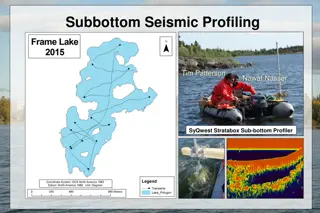Piseco Lake Environmental Data Analysis
This report highlights the environmental characteristics of Piseco Lake, including its physical and chemical data. The lake's water quality, transparency, temperature, dissolved oxygen levels, pH, alkalinity, phosphorous, nitrates, and chlorophyll levels are analyzed. The data shows trends indicating the lake's health and ecosystem balance, with insights into its productivity and algae production. Overall, the information underscores the importance of monitoring and managing Piseco Lake's ecological well-being.
Download Presentation

Please find below an Image/Link to download the presentation.
The content on the website is provided AS IS for your information and personal use only. It may not be sold, licensed, or shared on other websites without obtaining consent from the author. Download presentation by click this link. If you encounter any issues during the download, it is possible that the publisher has removed the file from their server.
E N D
Presentation Transcript
Lake Water Quality PLA Meeting August 17, 2019
Piseco lake Environment Characteristics Lake Area: 1,066 ha (2,634 acres or 10.2 m ) Max Depth: 38 m (125 feet) Shoreline: 25 km (15.5 miles) Water Retention Time: 1.5 years Watershed Area: 14,490 ha (56 m ) Forested Area (%) 83 Surface Water Area (%) 11 Wetland Area (%) 5 Developed Area (%) 1
Piseco Lake Physical Data Transparency Secchi disk measurement 3.5 m or 11.5 feet (range 2.5-4.3 m) Decreasing trend
Piseco Lake Physical Data Temperature Isothermal Epilimnion Hypolimnion Thermocline
Piseco Lake Physical Data Dissolved Oxygen Adequate at all depths
Piseco Lake Physical Data pH Average 7.0 (range 6.7 7.4) No trends observed No impact range is 6.5 - 7.5
Physical measurements Milligrams per Liter (mg/L) 1 inch in 16 miles 1 second in 11.5 days 1 minute in 2 years Micrograms per Liter ( g/L) 1 second in 32 year One sheet in a roll of toilet paper stretching from NYC to London
Piseco Lake Chemical Data Alkalinity (Calcium carbonate) Average 7 mg/L (5 8 mg/L) Moderate acid neutralizing ability Increasing trend
Piseco Lake Chemical Data Phosphorous Average 6.7 g/L (4.9 10 g/L) Low productivity lakes < 10 g/L High productivity lakes >20 g/L Decreasing trend
Piseco Lake Chemical Data Nitrates Average 8 g/L (BD 30 g/L) Decreasing trend
Piseco Lake Chemical Data Chlorophyll a Average 4.1 g/L (0.9 7.5 g/L) Low algae production <2 g/L High algae production >8 g/L No trends observed
Piseco Lake Chemical Data Calcium Average 2.4 mg/L (2.0 2.8 mg/L) Increasing trend Zebra muscles require 12 20 mg/L
Piseco Lake Chemical Data Aluminum Average 27 g/L (BD 47 g/L) No trends observed
Piseco Lake Chemical Data Chloride Average 5.6 mg/L (5 8 mg/L) Oxbow 20.3 mg/L Spy 15.2 mg/L No trends observed High road salt influence > 20 mg/L NH exposure value of 230 mg/L over 4 days may cause harm to aquatic organisms
Piseco Lake Chemical Data Specific Conductivity (2009 2018) Piseco average 33 41 S/cm Eat shore near NYDOT salt storage: 356 493 S/cm Undeveloped lakes range from 10 20 S/cm Road salt presence directly related to conductivity values
Trophic State Eutrophic Excess nutrients Elevated biological activity Depressed transparency Anoxic bottom water
Trophic State Oligotrophic Deep lakes Low nutrients Low biological productivity High transparency Adequate oxygen at bottom
Trophic State Mesotrophic Intermediate between oligotrophic and eutrophic Chlorophyll-a concentration between 2.1 and 8.0 g/L Just over 70 % of the 100+ Adirondack Lakes samples by AWI were mesotrophic
Harmful algae Blooms (HABs) Characteristic green color
HABs Blue-green algae (cyanobacteria) Contain cytotoxins Confirmed HABs have Chlorophyll-a levels >25 g/L Lakes with zebra muscles and quagga mussels Low N:P ratio (Piseco ration 1.1)
HABs NYSDEC has a web site with daily updates of affected lakes























